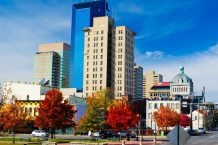McConnell Springs is a 26-acre natural pocket within an industrial area. The park is home to unique karst features such as the sinking artesian springs that give the park its name. McConnell Springs is also a historic site that is celebrated as the location where Lexington was named in 1775. First settled by William McConnell in 1779, the property has been used for various industries over the past 2 centuries but stands today as a natural area park with nearly 2 miles of trails for all to enjoy.
Current Sustainable Practices
Below are the initiatives McConnell Springs has completed on the Green Check scorecard.
Sustainability Management and the Green Team
- Designate a Sustainability Coordinator or Green Team responsible for managing sustainability initiatives.
Awareness, Education, and Outreach
- Include sustainability tips in a monthly newsletter.
- Include a sustainability statement and training in all new hire materials.
- Highlight sustainability efforts or initiatives at career fairs or career days.
- Provide volunteers for community environmental projects annually.
- Host an environmental event at your location.
- Participate in, present at or attend a sustainability workshop.
Energy Efficiency
- Establish a power-down policy and checklist that includes items such as shutting off lights at night.
- Set water heater thermostats to a maximum of 120 degrees or install an inline water heater.
- Replace incandescent or CFL lights with LED lights (76-100% replacement).
- Upgrade all Exit signs to LED.
- Delamp vending machines.
- Establish a regular filter maintenance policy for your HVAC system.
- Have your HVAC system evaluated every 2 years by a certified service provider.
- Establish a dress code that encourages employees to dress for thermal comfort.
- Install power strips for computers and equipment to power down during non-business hours.
- Install programmable thermostats and use them to adjust temperature during unoccupied hours.
- Install occupancy sensors in bathrooms, meeting rooms, and other infrequently used areas.
- Insulate roof to control energy loss.
- Take measures to insulate HVAC system and ductwork to minimize heat loss.
- Perform external lighting audit.
- Daylight work spaces wherever possible.
Waste Reduction and Recycling
- Implement a basic recycling program.
- Conduct a waste audit (within the past two years).
- Provide clearly marked recycling bins at work stations and/or in common areas. Recycling bins must be paired with a waste bin.
- Train and require janitorial service or staff responsible for cleaning to segregate waste and recyclable materials.
- Use reusable mugs and dishware instead of disposable plates, cups, and utensils.
- Establish a policy for environmentally friendly printing such as two sided printing, reusing copy paper, and electronic document sharing.
- Establish an electronic waste policy that diverts all e-waste away from landfill.
- Replace at least 50% of paper stock with post-consumer recycled paper.
- Develop or participate in an existing composting program.
Water Conservation
- Conduct a water audit within the last three years. Monitor and record water usage, check indoor and outdoor pipes and fixtures for drips and leaks.
- Establish a policy for purchase of high efficiency (i.e. WaterSense) rated fixtures and appliances.
- Install water efficient faucets in all of the restrooms.
- Install water efficient toilets in all of the restrooms.
Water Quality
- Establish a policy for proper hazardous waste and chemical disposal.
- Perform a stormwater pollution survey on your property with BGGS staff or other qualifies professional.
- Coordinate or participate in a community litter clean-up.
- Install outdoor ash trays to prevent cigarette litter, and make pocket ash trays available to staff who smoke.
Urban Forestry and Landscapes
- Participate in a community reforestation project.
- Assess the ecosystem services of trees on property using the National Tree Benefits Calculator.
- Establish a native species-only plant replacement policy for tree and shrub planting.
- Remove all invasive species from property.
- Establish environmentally friendly lawn care policies to reduce chemical pesticide and fertilizer use.
- Plant a pollinator garden.
- Plant a rain garden.
Sustainable Purchasing
- Establish a policy for reducing the toxic chemicals/materials in your workplace.
- Establish a policy to purchase non-Styrofoam cups and plates for use at the workplace or at events.
- Establish a policy for purchasing locally, if available.
Transportation Efficiency
- Establish and implement a no-idling policy.
- Conduct a commuter or employee transportation survey.
- Adopt a telecommuting option and make it available to employees.
- Designate parking spaces for hybrid vehicles and/or install EV charging stations.
- Install a bike rack with sufficient space for at least 10% of your employees.
- Place bicycle storage closer than any other designated parking spot.
Innovation
- Offer bilingual water tours.
- Host composting workshops and have demonstration composting bins on site.
- Offer dry stone workshops and fences, preserving the property and the craft.
- Install catch basins in rain garden for run-off.
- Offer annual jack-o-lantern trail walk.

Member since 2023






